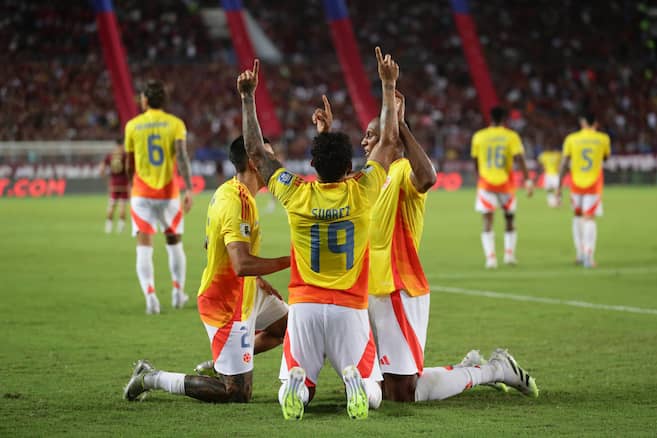

Colombians celebrate their triumph in Maturín.
Photo: EFE – Ronald Peña R
Summary and Fast Informame
Listen to this article
Audio generated with Google
After the classification to the next World Cup, a question began to be around among national football fans: what would have happened if the 2026 World Cup classification would not have changed? Sure, the history of the Colombian National Team would have been much more suffered.
Before, Conmebol delivered four direct quotas and one to the repechage, so the tricolor would have reached the last date in the sixth position, outside the World Cup. In that scenario, the match against Venezuela would have had an extreme drama: it would not have been the 6-3 that we saw in Maturín, but a much more closed duel, with Colombia playing life and Venezuela, without possibilities, perhaps less thrown into the attack.
The historical result in Venezuelan soil was possible, in part, because the local team had nothing at stake. That context allowed an open procedure, with the Vinotinto overturned to the front and leaving spaces that Colombia took advantage of.
It is difficult to imagine that, with vital points in dispute for both, the game would have ended with nine goals and with Luis Javier Suárez signing a poker. Surely it would have been a locking encounter, of maximum tension and much less spectacular.
This would have remained the table of the qualifiers
Under the four quotas and repechage system, third place was not guaranteed. Colombia would have needed to win yes or yes to reach, at best, the fourth or fifth place, depending on other results.
That type of pressure would have conditioned Néstor Lorenzo's approach, betting on a more calculated and less risky game. In addition, direct rivals, such as Paraguay and Brazil, would have played with the obligation not to give ground, hardening the final day further.
A fact that attracts attention is that Brazil, which ended in the fifth position with 28 points, would have had to go to international repechage. An unprecedented situation for the “Canarinha”, accustomed to directly classifying all World Cups.
This shows how tight this tie was and how much it benefited the increase in quotas at six direct places plus repechage.
Colombia, to think about the World Cup
The new format, without a doubt, gave Colombia margin to breathe and plan more calmly.
Despite the initial pressure of arriving sixth on the last double day, Lorenzo's team closed with two victories that allowed him to finish third and now he can prepare the World Cup without shocks.
If the previous system was maintained, the classification would have been a true advanced end, at risk of repeating the suffering of previous qualifiers.
🚴🏻⚽🏀 The latest in sports?: Everything you should know about world sport is in the spectator

